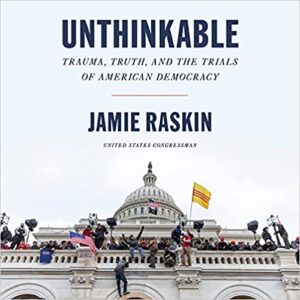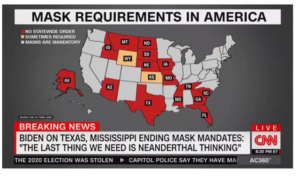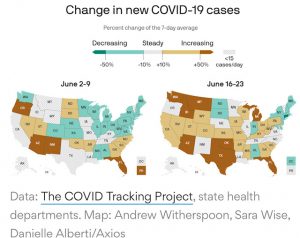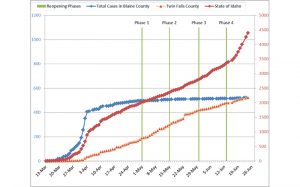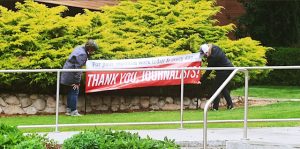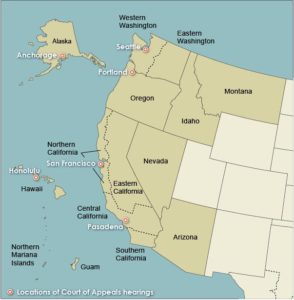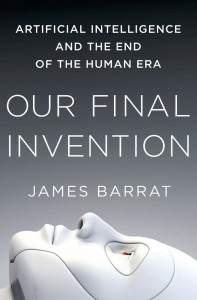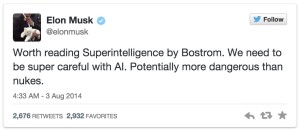Boise State Public Radio
Extremely American
February 9, 20222.9.22
Post by James Dawson at Boise State Public Radio on Twitter:
“The Idaho National Guard wants to repeal a section of state law that bans private militias, saying it’s unconstitutional. A prominent anti-extremist institute disagrees.” boisestatepublicradio.org/politics-gover #idpol #idleg
Why is the Idaho National Guard interested in repealing this? -dayle
“Militias have risen to prominence in recent years in Idaho.”
The 51st State
‘Way up in the Northern Rockies there’s a sort of mythical 51st state. It’s called the American Redoubt and it encompasses Idaho, Montana, Wyoming, and parts of Oregon and Washington. Adherents to its philosophy believe in a kind of theocratic limited government utopia, one with lots of guns. Alex Barron is the movement’s self-appointed “bard” and his rhetoric has all the violence of a Shakespearean tragedy.”What are you willing to kill for?” he asks a crowd of far-right activists wondering about where the line should be when responding to the government with force.Redoubters like Barron talk about their movement like evangelists and in a way they are – they are recruiting people to move there, live off the grid and run for office. And it’s working – they are reshaping their communities in Idaho and surrounding states, and as far as they’re concerned, those who disagree can leave.’
-Heath Druzin, @HDruzin, Boise State Public Radio
#MustListen podcast created and written by Druzin; immensely educational. It’s dark, yet absolutely necessary to unpack what is happening with the growth and organization of militia groups in Idaho and across the country. -dayle
Is now like then?
January 18, 2022Sound familiar?
“To control information is to control the world. This innovative history reveals how, across two devastating wars, Germany attempted to build a powerful communication empire―and how the Nazis manipulated the news to rise to dominance in Europe and further their global agenda.”
“Information warfare may seem like a new feature of our contemporary digital world. [And FOX media/Rupert Murdoch.] But it was just as crucial a century ago, when the great powers competed to control and expand their empires. In News from Germany, Heidi Tworek uncovers how Germans fought to regulate information at home and used the innovation of wireless technology to magnify their power abroad.”
pp. 3-4:
“In 1926, 90% of all newspapers had no correspondents abroad or in Berlin. They received all their national and international news through news agencies or syndicate services. Today, we worry about whether Facebook or Google hold monopolies over information provision. New agencies exerted an arguable even greater grasp over national and international news in the first half the 20th Century.
(Always follow the money…corporate owned media. -dayle)
p. 229:
“In the second half of the 20th century, newspaper ownership seemed like license to print money. Newspapers averaged annual returns of in the United States. Some newspapers generated profits of 30%. In comparison, grocery store profits were in the 2% range and department stores around 4%. In non-exceptional periods, when profits are hard to come by, companies become more reliant on the state or more susceptible to outside control The problem of profits has long made news firms likelier to participate in business arrangements like cartels and monopolies as well as more open to outside influences..
p. 231:
“When elites no longer believe in upholding democratic institutions, a free press alone could not stop a democracy’s disintegration. Democracy can die in full daylight, and has done before.”
[The book, 2019, has received the Fraenkel Prize from the Wiener Holocaust Library and the Ralph Gomory Prize from the Business History Conference and the Alfred P. Sloan Foundation.]
Sage Publication Journals
https://journals.sagepub.com/doi/full/10.1007/s12290-014-0315-5
[2014]
Economic Crisis and Political Extremism in Europe: From the 1930s to the Present
by, Antonis Klapas
Historical experience shows that when economic conditions remain bad for a significant period of time people tend to become more radical as far as their electoral behaviour is concerned. However, no matter how strong the linkage between economic crisis and the rise of political extremism might be, economic crisis is not the only factor to be taken into account when analysing the phenomenon of political extremism, as other parameters (historical, social and so on) are also important.
The economic crisis of the 1930s had a profound effect on European politics. The vicious circle of underdevelopment, unemployment and poverty that started in 1929 created massive social problems and thus favoured the strengthening of extremist parties, especially far-right ones (Table 1). The case of Germany was probably the most characteristic and definitely the most important one as far as its long-term consequences were concerned. Before 1929 Adolf Hitler’s National Socialist party was nothing more than a marginal political force. In the German federal elections of May 1928 they won only 2.63 % of the vote. Just two and a half years later, in September 1930 they secured 18.25 %. In the elections of July 1932 they came first with 37.27 %, a place that they managed to hold in November of the same year despite the fact that their share of the vote was reduced to 33.09 % (Gonschior 2005). On 30 January 1933 Hitler became chancellor of Germany and gradually began to impose his dictatorial and racist regime. The Weimar Republic was dead. Europe was, little by little, sliding towards the abyss of the Second World War.
The establishment of Benito Mussolini’s FASCIST regime in Italy in 1922 had already paved the way towards the dominance of political extremism. However, it was only in the 1930s that anti-democratic parties across Europe became more successful.
As in the 1930s, today most far-right extremists promise to overthrow the established political system. In general, they describe politicians (excluding themselves, of course) as corrupt and decadent. They take advantage of the mass media (with special emphasis on social media which give them the opportunity to attract the attention of younger audiences) in order to get their messages across. They make extensive use of stereotypes to address the public and they use black-and-white arguments which, despite their poor reasoning, sound reasonable to the average voter. They are conservative on societal issues and sometimes openly homophobic. They reject liberal ideas and they have racist tendencies. They underline the threat of the expansion of Islam in Europe, while at the same time some of them are anti-Semitic. They point to immigrants as one of the main causes (if not the main cause) of all sorts of problems, from unemployment to high criminality. In some cases, they do not disapprove of and talk with respect or even admiration about FASCIST and Nazi leaders of the past. There are also those who do not hesitate to resort to violence in order to intimidate others.
AXIOS
1.18.22:
Trust in governments around the world is collapsing, especially in democracies, Axios Media Trends author Sara Fischer writes from a new global survey.
- Why it matters: People don’t think government, business or the media are telling them the truth. This suspicion of societal institutions is pushing people into smaller, more insular circles of trust.
Government leaders and journalists are the least-trusted societal leaders, according to Edelman’s 2022 global “Trust Barometer,” a survey of 35,000 respondents in 28 countries.
- A majority of people globally believe journalists (67%), government leaders (66%) and business executives (63%) are “purposely trying to mislead people by saying things they know are false or gross exaggerations.”
- Around the world, people fear the media is becoming more sensational for commercial gain and that government leaders continue to exploit divisions for political gain.
[Trust in neighbors and co-workers has apparently ⬆️.]
[AXIOS-Sarah Fischer]
ON THE MEDIA
#MustListen
Since the insurrection on January 6, warnings of a second American Civil War have been sounded. This week, On the Media explores whether the civil war talk is an alarmist cry, or actually a sober assessment. Plus, hear how the myth of “the Dark Ages” paints an unfair portrait of medieval times.
1. David Remnick, editor of The New Yorker and host of the New Yorker Radio Hour, on the risk of second civil war. Listen.
“In the current context, is ‘Civil War’ a metaphor, a proposed diagnosis for what ails our country? Or is it meant to be taken literally? In a recent essay in The New Yorker, editor David Remnick suggests both. He writes that ‘for the first time in two hundred years, we are suspended between democracy and autocracy. And that sense of uncertainty radically heightens the likelihood of episodic bloodletting in America, and even the risk of civil war.’ Remnick tells Brooke about the value of ‘a journalism of warning,’ and why cautions of civil war should be heeded. -OTM
2. Barbara Walter [@bfwalter], professor of International Relations at the University of California, San Diego, on the tell-tale signs that a country is headed for insurgence. Listen.
“To a subset of the White population here this is deeply, deeply threatening… They see the United States as a White Christian country. And they feel like they’re justified to fight to maintain it.”
“Sadly, if we remain ignorant about how power operates in American politics, then people with nefarious purposes will step in and take it away from us. It’s why a civics curriculum in schools would create a stronger electorate and lead to greater faith & trust in the system.”
‘Everybody thought their civil war was unique,’Barbara F. Walter writes in her new book, How Civil Wars Start: And How To Stop Them. ‘So no one saw the risk factors that emerged again and again no matter where war broke out.” According to Walter, who has studied civil wars around the world for the past three decades — from Syria to Northern Ireland to Sri Lanka — the same warning signs appear each time. And now Walter says she sees those same signs here, in the United States. This week, she discusses them with Brooke.” -OTM
Anocracy or semi-democracy: a form of government that is loosely defined as part democracy and part dictatorship, or as a “regime that mixes democratic with autocratic features.” … Such regimes are particularly susceptible to outbreaks of armed conflict and unexpected or adverse changes in leadership. [wikipedia]
According to Professor Walter, a new Civil War would not look like the old one…
[Image: MSNBC]
U.S. democracy downgraded in 2016 and 2019. “U.S. no longer deemed longest consistent democracy.” It is now Switzerland.
#Anocracy
3. Charlie Warzel [@cwarzel], journalist and contributing writer at The Atlantic, on when journalists should sound the alarm (and how loud we should ring it). Listen.
“Since the anniversary of January 6th, the pundit industrial complex has been churning out new ‘takes’ on a possible civil war every day. Could it be “like the summer of 2020, but 10 times bigger”, or ‘a Seinfeld civil war’— a war about nothing? Amid the noise, it has only become more difficult to determine the proper level of alarm. Journalist Charlie Warzel tried to help everyone calibrate in the latest installment of his newsletter for The Atlantic, Galaxy Brain. This week, Brooke and Charlie discuss the role of alarmism in the face of seemingly existential problems, and who the real ‘doomsayers’ actually are.
4. David M. Perry [@Lollardfish] and Matthew Gabriele [@prof_gabriele], authors of The Bright Ages: A New History of Medieval Europe, on how the Dark Ages might have not been so dark. Listen.
Today, when we encounter the medieval world it’s mostly a dark time. Un-enlightened by reason, but also literally gloomy – all bare stone and grey skies. We know it as a brutal time, dominated by white men with steeds and swords, or drenched in blood by marauding Vikings. But in their new book, The Bright Ages: A New History of Medieval Europe, historians Matthew Gabriele and David M. Perry trace the harm of the myths of the “Dark Ages,” and illuminate the medieval stories that have mostly escaped our modern gaze. -OTM
Boise State Public Radio
#MustListen
Excellent reporting from journalist Heath Druzin and the team at KBSX, Boise State Public Radio.
‘This podcast takes you inside the world of ascendant Patriot Movement, the militia members & far-right activists who are simultaneously preparing to fight the government & become part of it.’
https://podcasts.apple.com/us/podcast/extremely-american/id1599294971
Voices of Freedom, edited/produced by me; see if you can the identify the speakers. -dayle
‘Congressman Jamie Raskin has proudly represented Maryland’s 8th Congressional District in the U.S. House of Representatives since 2017. Prior to his time in Congress, Raskin was a three-term State Senator in Maryland and the Senate Majority Whip. He was also a professor of constitutional law at American University’s Washington College of Law for more than 25 years.’
[His book is #1 this week on the NYTimes hardcover non-fiction Best Seller’s List.]
“I have learned that trauma can steal everything from you that is most precious and rip joy right out of your life,” Raskin writes. “But, paradoxically, it can also make you stronger and wiser, and connect you more deeply to other people than you ever imagined by enabling you to touch their misfortunes and integrate their losses and pain with your own.”
“If a person can grow through unthinkable trauma and loss,” Raskin continues, “perhaps a nation may, too.” [NPR]
“When everything looks hopeless, you are the hope.”
-Marcus Raskin
U P D A T E
Like Germany, pre-WWII. This from Gallup, February 2022. Posted by political scientist Ian Bremmer on Twitter.
Overall quality of life:
2020: 84% 2022: 69%
System of government:
2020: 43% 2022: 30%
Economy:
2020: 68% 2022: 33%
Role in world:
2020: 43% 2022: 37%
MASS
October 15, 2021Boise State Public Radio
‘It’s about themes of forgiveness, themes about reconciliation, about healing, and physical harm, about connection. Beautiful and shattering film. “The Chicago Reader compared the script to Tennessee Williams, adding it is “riveting, unforgettable.”
‘…the choice of the Wood River Valley as a backdrop for his (Fran Kranz) movie: “Emmanuel Episcopal Church in Hailey is a beautiful red brick church. It’s gorgeous. But it also has this modesty. It has a humility about it. It has an authenticity.”’
‘Just prior to his film opening in Idaho, Fran Kranz visited with Morning Edition host George Prentice to talk about the powerful themes of his film, and his choice of the Wood River Valley as a backdrop for his movie.’
Fran Kranz:
I had my daughter, my first child was born and my only child was born September twenty sixteen. And so she was about a little over a year old when the Parkland shooting happened and I was devastated. And this completely new and surprising way. I remember listening to a parent that day and having to pull over while I was driving. I was listening to this on the radio and I was so overwhelmed and I thought it was strange. I honestly just thought, what’s going on? I’ve never reacted this way, and the obvious answer was that I was a father now and it changed my perspective. And then what? What happened after was essentially just I. I became obsessive and went down a rabbit hole of research reading about mass shootings, school shootings, anything I could find on the subject.
I looked at churches as you know, there’s beautiful churches in Idaho, but I. And look, Emanuel Episcopal in Hailey is a beautiful brick red brick church. It’s gorgeous, but it also has this modesty. It has a humility about it. It has an authenticity about it where it’s not a grand design, you know, and nothing against. The church is in Ketchum, but they’re they’re esthetically sort of magnificent, right, and I thought, No, no, no, no, that’s that’s not what this is.
There was a sort of a mantra to the movie of embracing discomfort. So we’re in we’re in just a plain white room, you know, we’re in a church that we cannot use photography or production design to help us tell this story. That’s not what the story is about the stories about these people in the in the courageous thing that they’re doing by coming together to deal with their pain.
Hailey Emanuel Episcopal and Hailey was the last church I saw actually on that trip, and it was really, really came down to Leah Koval, Reverend Leah Koval, who (ran) that church. I spoke with her that day and it sort of turned into a therapy session, which made me really uncomfortable. She said to me, listening to my story and the story I wanted to tell, she said, I I hope you can start to enjoy being a father. And I thought I was just, it makes me so emotional, just even saying that today it just it just penetrated. It just hit me when I wanted to get out of there. But I also knew this is it. This is the church. So we, we we got gearing up for an Idaho production.
Idaho’s Dr. Fauci
March 4, 2021Dr. David Pate serves on the Idaho COVID task force. He is the former President & CEO of St. Luke’s Health, receiving an MD in internal medicine from Baylor College of Medicine, and a JD in health from University of Houston Law Center.
Many of us who live in Idaho are exhausted by a politically polarized legislature, none more than Dr. Pate who continually puts the health of Idahoans first, while the state legislature does not. (Many whom are less than intellectually sound and gravitate to red hats, but, hey, that’s a personal take.)
Here is a recent thread from Dr. Pate’s twitter feed as we head into a potential fourth wave of COVID while states like Mississippi and Texas reverse mask mandates and open businesses. Idaho just introduced legislation this week that would eliminate mask mandates in certain communities, like Blaine County and McCall. Governor Brad Little never implemented a state-wide mask mandate. -dayle
Dr. Pate:
As Idaho Republicans keep introducing bills, I have to continue to rearrange to a new one to the list of stupidest bills. This is ridiculous. Legislation Introduced That Would ban Mask Mandates in Idaho.
~
I warned school board members in the middle of February: Please don’t commit to bringing students back for full in-person classes given admin admitted that we would have to decrease physical distancing. I warned that the UK variant behaves differently in schools and it is likely to become the dominant strain right as you plan to bring all these students back. At that time, the UK variant accounted for about 1% of cases. Today, just two weeks later it accounts for an estimated 10% of cases.
That is a doubling time of 5.6 days.
Using some simple math – with West Ada’s plan to bring everyone back in 26 days – that would mean 4.5 more doubling times = the UK variant will indeed be the predominant strain, in fact, unless we find that one of the other variants (maybe the California variant?), out-competes it, it will completely replace the previous variants on which their whole operating plan was based. I should know- I wrote it.
This variant [P1] has shown up next door, Idaho. I guarantee you this is not the time to give up masks & physical distancing, & I have no idea why elected leaders think we should have larger gatherings. Brazil’s Covid Crisis Is a Warning to the Whole World.
Brazil’s Covid Crisis Is a Warning to the Whole World, Scientists Say
Brazil is seeing a record number of deaths, and the spread of a more contagious coronavirus variant that may cause reinfection.
Dr. Pate can be heard on Boise State Public Radio’s ‘Idaho Matters’, every Wednesday, KBSX radio, or online streaming. Also available via podcast.
https://www.boisestatepublicradio.org/#stream/0
~
From the Washington Post this afternoon, 3.4.21:
Health officials continue to criticize Texas and Mississippi’s moves to rescind mask mandates and let businesses operate at full capacity.
The nation’s top infectious-disease expert, Anthony S. Fauci, called the choices “ill-advised,” while some local officials begged residents to keep wearing face coverings. Previously plummeting infection totals in the United States have stalled in recent days, possibly because in part to the spread of more contagious variants.
Many businesses in Texas and Mississippi were quick to remove their “masks required” signs, but some of the country’s biggest retailers – including Target and Starbucks – said they would continue to mandate masks in their Texas stores to protect front-line workers and customers.
Meanwhile, Europe is also experiencing an end to six weeks of declining case numbers as the virus mounts an unwelcome resurgence. New cases have risen by 9 percent in the past week, with central and eastern Europe impacted the most. World Health Organization officials attributed some of the increase to a more contagious variant, first detected in the United Kingdom, that is driving an outbreak in the Czech Republic and Hungary.
~
From Dr. Anthony Fauci:
Public health officials have been warning of a possible fourth wave of the pandemic should the nation let its guard down, especially since the seven-day average of new cases remains at roughly 65,000 in the U.S.
“I don’t know why they’re doing it, but it’s certainly from a public health standpoint ill-advised.” If you look at, right now, the curves of the diminution of infections that are going down, it’s reached the point where the last seven days have plateaued. We’ve been to this scene before, months and months ago when we tried to open up the country and open up the economy, when certain states did not abide by the guidelines, we had rebounds that were very troublesome.”
Earlier in the day, Centers for Disease Control and Prevention Director Rochelle Walensky acknowledged that a year of restrictions was helping to fuel a worrisome change in behavior.
“Stamina has worn thin,” Walensky said during a press briefing Wednesday morning. “Fatigue is winning, and the exact measures we have taken to stop the pandemic are now too often being flagrantly ignored.” [Yahoo News]
One perpetual wave.
June 25, 2020U P D A T E
WASHINGTON POST/Thursday, June 25th
State health departments reported 38,115 new infections on Wednesday, the highest single-day caseload in the United States since the pandemic began. As for the total, true number of infections, CDC Director Robert Redfield said Thursday: “Our best estimate right now is that for every case that’s reported, there actually are 10 other infections.”
The new spike was caused by a rush to reopen without proper safety measures in place, infectious-disease experts say, and the push to do so, even as cases climb, sends a dangerous and inaccurate message.
AXIOS
‘A nationwide crisis, made worse by a vacuum of political leadership, threatening to overwhelm hospitals.’
The pandemic is getting dramatically worse in almost every corner of the U.S., Axios health care editor Sam Baker and visual journalist Andrew Witherspoon report.
- ⚡ This is the grimmest map in the eight weeks since Axios began tracking the state-by-state change in new cases.
-
- Nationwide, cases are up 30% compared to the beginning of this month
- Dramatically worsening outbreaks in several states are beginning to strain hospital capacity — the same concern that prompted the nationwide lockdown in the first place.
- Over half the country — 26 states — has seen its coronavirus caseloads increase over the past week.
Trying to unpack this logic:
Governor Brad Little, (R) Idaho, will not mandate masks because “compliance would be terrible.”
Boise (Ada County) COVID numbers, like in Arizona, California, Texas, and Florida, continue to exponentially increase.
From Boise State Public Radio [KBSX] reporter Heath Druzin:
On the day the governor says Idaho is not meeting its #COVID19 goals, and in the midst of a local outbreak, just saw a @CityOfBoise employee pull up in a city car and walk into a gas station store with no mask. So that’s how seriously we’re taking the pandemic right now.
More from Heath:
Idaho saw its highest number of lab-confirmed COVID-19 cases in a single day Wednesday, with 223 and another 20 probable cases. There was also an additional death, bringing the state’s total to 90.
⬆️
Wednesday’s total includes 101 cases in Ada County, which is in the midst of a spike, with some tied to downtown bars where patrons did not practice physical distancing. In response, Central District Health has ordered bars in the county to close again and the county to return to Phase 3 of reopening.
There have been 908 cases over the last seven days, representing by far the worst week for COVID-19 infections in Idaho since the pandemic began in March. In addition, Idaho Gov. Brad Little announced the first confirmed infection of an inmate at an Idaho correctional center.
https://www.boisestatepublicradio.org/post/idaho-sees-highest-one-day-covid-19-total
Vacation bookings are up in the Mountain West with folks looking for outdoor escape from their own dramatically increasing COVID numbers. Guides report a record increase in bookings. From Eye On Sun Valley:
Silver Creek Outfitters’ three dozen fishing guides have seen a record number of requests for guided fishing outings this summer from out-of-state visitors eager to escape coronavirus lockdowns.
While grateful for the extra business, it does present a conundrum for some.
“Terry Ring has put a whole lot of precautions in place and fly-fishing is an activity in which you can social distance,” said fishing guide Bob Knoebel. “But, while I feel confident with most of the people in the valley, I’m not as comfortable with people from outside the valley because I have no idea where they’ve been and who they’ve been with.
From CDC website. (A reminder to consider the source.)
“Do we need to get a flu vaccine earlier this year (i.e. July/August)?
While the Advisory Committee on Immunization Practices has not yet voted on the flu vaccine recommendations for 2020-2021, CDC does not anticipate a major change in the recommendation on timing of vaccination. Getting vaccinated in July or August is too early, especially for older people, because of the likelihood of reduced protection against flu infection later in the flu season. September and October are good times to get vaccinated. However, as long as flu viruses are circulating, vaccination should continue, even in January or later.
Will there be changes in how and where flu vaccine is given this fall and winter?
How and where people get a flu vaccine may need to change due to the COVID-19 pandemic. CDC is working with healthcare providers and state and local health departments to develop contingency plans on how to vaccinate people against flu without increasing their risk of exposure to respiratory germs, like the virus that causes COVID-19.
Some settings that usually provide flu vaccine, like workplaces, may not offer vaccination this upcoming season, because of the challenges with maintaining social distancing. For more information on where you can get a flu vaccine, visit www.vaccinefinder.govexternal icon.”
CNBC
The National Institutes of Health has been fast-tracking work with biotech firm Moderna on a potential vaccine to prevent Covid-19, which has infected more than 6.28 million people worldwide and killed at least 375,987, according to data compiled by Johns Hopkins University.
Dr. Anthony Foci said earlier this month that the biotech company expects to enroll about 30,000 individuals when it begins a phase 3 trial in July. He said there are at least four trials for potential vaccines that he is either directly or indirectly involved in.
Fauci said that by the beginning of 2021 “we hope to have” hundreds of millions of doses.”
When asked whether scientists will be able to find an effective vaccine, Fauci said he’s “cautiously optimistic,” adding that “there’s never a guarantee.” He cautioned “it could take months and months and months to get an answer” before scientists discover whether the vaccine works.
U.S. officials and scientists are hopeful a vaccine to prevent Covid-19 will be ready in the first half of 2021 — 12 to 18 months since Chinese scientists first identified the coronavirus and mapped its genetic sequence.
It’s a record-breaking time frame for a process that normally takes about a decade for an effective and safe vaccine. The fastest-ever vaccine development, mumps, took more than four years and was licensed in 1967.
However, scientists still don’t fully understand key aspects of the virus, including how immune systems respond once a person is exposed. The answers, they say, may have large implications for vaccine development, including how quickly it can be deployed to the public.
C-SPAN
Dr. Fauci stestifying earlier this week in Washington D.C. on the federal pandemic response.
Community love for local journalists.
May 13, 2020This morning outside the KBSX, Boise State Public Radio Studios.
♡
Environmentalists & the 9th Circuit
March 12, 2019An environmental group is launching a campaign to defend the 9th Circuit Court of Appeals which has been a target for President Trump. The court hears some of the most important environmental and other cases in our region.
“Well you go to the 9th Circuit and it’s a disgrace and I’m going to put in a major complaint, because you cannot win if you’re us, a case in the 9th Circuit,” he told reporters in November of last year.
Because the 9th Circuit covers much of the Western U.S. it hears a lot of cases about public lands and endangered species. It’s currently considering Juliana vs. United States, the case where kids are suing the federal government for failing to act to combat climate change. The 9th Circuit recently rejected challenges to a 2012 Department of Interior decision to withdraw, for up to 20 years, over one million acres of land near Grand Canyon National Park from new uranium mining claims.
The League of Conservation Voters is launching a campaign to fight for neutral judicial nominees on that court.
“It’s so important that that court remains fair and objective and has qualified judges sitting on it who make decisions that impact our clean air and clean water,” says Ben Driscoll, Judiciary Program Director with the nonprofit.
President Trump has nominees for four out of the five vacant judges seats. Those nominees still have to go before the Senate before being confirmed.
Find reporter Amanda Peacher on Twitter @amandapeacher.
Listen:
Artificial Intelligence
June 14, 2015“The development of full artificial intelligence could spell the end of the human race”, said esteemed professor Stephen Hawking. “Humans, who are limited by slow biological evolution, couldn’t compete and would be superseded.”
Reader’s Corner with Bob Kustra/Boise State Public Radio
“Until now, human intelligence has had no rival. But as Artificial Intelligence continues to advance, we should ask ourselves: Can we coexist with computers whose intelligence dwarfs our own? In his book, “Our Final Invention: Artificial Intelligence and the End of the Human Era,” James Barrat peers into the future to explore the perils of developing super intelligent machines. And he extends a heartfelt invitation to join what he calls the ‘most important conversation humanity can have.’ Mr. Barrat is a documentary filmmaker who’s written and produced films for National Geographic, the Discovery Channel, PBS and many other broadcasters in the United States and Europe.”
“I am in the camp that is concerned about super intelligence. First the machines will do a lot of jobs for us and not be superintelligent. That should be positive if we manage it well. A few decades after that, though, the intelligence is strong enough to be a concern.” -Bill Gates




